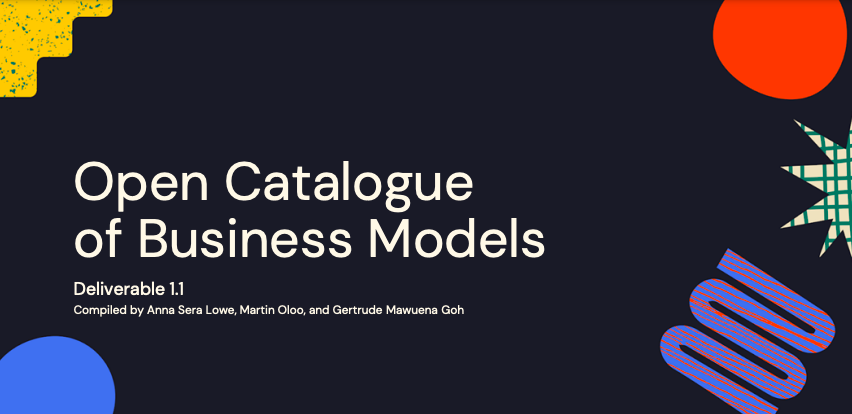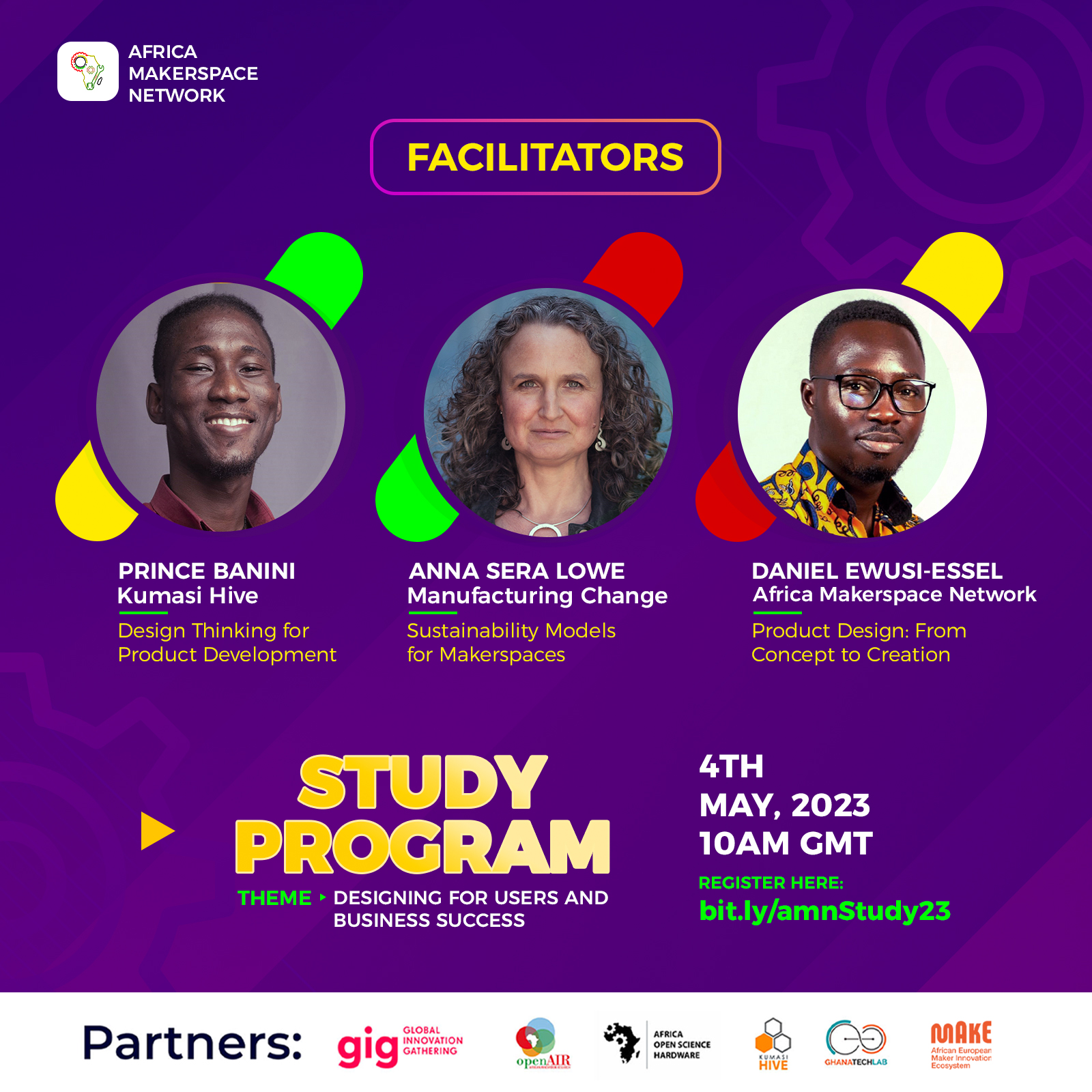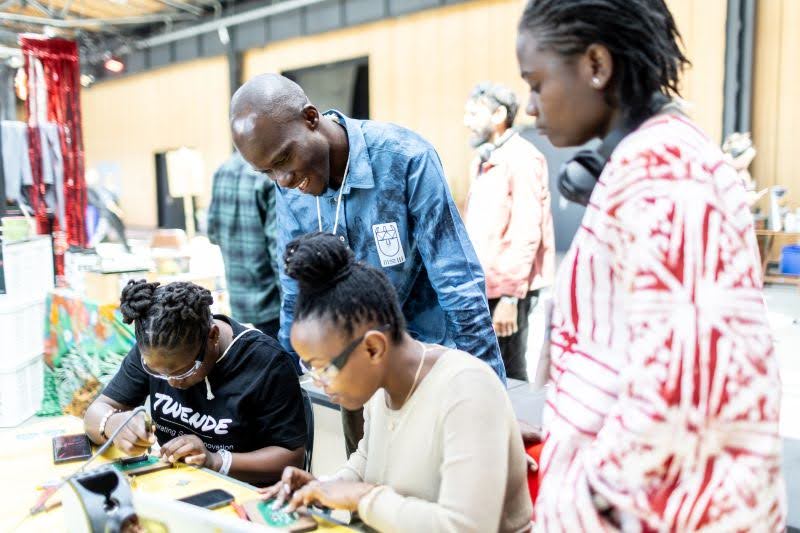Embracing Sustainable Business Models: Reflections on the Africa Makerspace Network Study Program
- August 25, 2023
- 5 min read
The Africa Makerspace Network Study Program is a program developed annually by the Africa Makerspace Network within mAkE. This year, it has provided us with a unique and transformative experience, immersing in the world of makers and empowering us to explore the potential of sustainable business models. In this blog post, we reflect on our enriching journey during the program, delving into the key learnings and insights gained. Our focus revolves around the vital aspects of sustainable business models, product development, design thinking, and our connection with the mAkE project. These invaluable lessons have equipped us with practical skills to drive innovation, achieve business success, and make a positive impact within the vibrant and dynamic maker community.
Sustainable Business Models for Makers
A standout feature of the study program was the comprehensive exploration of sustainable business models tailored specifically for makerspaces. Through the guidance of Anna Lowe, an esteemed expert from the mAkE project, we delved deep into the intricacies of revenue streams, cost reduction strategies, and the significance of for-profit and for-purpose ventures. We thoroughly examined a range of business models, including grants/sponsorships, product sales, consultancy services, and membership models. As we explored these different models, we gained a deeper understanding of their potential to create sustainable income streams for both start-ups and SMEs. Check out the Open Catalogue of Business Models here.

Innovation through Product Development
Another focal point of the program was the dynamic realm of product development, where we gained profound insights into material selection, manufacturing processes, and supply chain management. The facilitators emphasized the advantages of distributed manufacturing, illustrating its transformative potential in shaping the future of making. We explored how distributed manufacturing enables localized production, reduces transportation costs, and promotes sustainable practices. Furthermore, we gained a comprehensive understanding of the product development lifecycle, from ideation and prototyping to manufacturing and distribution. The facilitators’ expertise and practical knowledge provided us with the necessary tools to navigate the complexities of product development with confidence.
Design Thinking for Enhanced User Experience
In addition to product development, the study program placed a strong emphasis on design thinking—a user-centered approach that fuels innovation. Through engaging workshops and exercises, we learned how to empathize with users, define problem statements, ideate creative solutions, prototype concepts, and iterate based on user feedback. Design thinking not only helped us develop user-centric products but also fostered a culture of innovation and collaboration within the maker community. By incorporating design thinking principles into our creative processes, we gained a deeper understanding of user needs, preferences, and pain points, enabling us to design solutions that truly resonate with our target audience.
Connecting with the mAkE Project
Throughout the study program, we felt a strong sense of connection and alignment with the mAkE (African European Maker Innovation Ecosystem) project and its overarching goals. The mAkE project is a collaborative initiative between African and European innovation spaces, aimed at fostering sustainable networks, collaboration, and shared policy frameworks. It seeks to empower makers to develop innovative solutions that address local and global challenges while promoting sustainable development.
The mAkE project’s commitment to fostering collaboration and sustainable networks resonated deeply with our aspirations for growth and impact. We eagerly anticipate the launch of the Open Catalogue of Business Models, a resource developed by the mAkE project, with a potential to catalyze innovation, collaboration, and sustainable growth within the maker community. . This catalog will serve as a comprehensive reference guide, providing insights, inspiration, and practical guidance for sustainable ventures within the maker community. By sharing best practices, case studies, and success stories, the Open Catalogue of Business Models will undoubtedly be an invaluable asset, offering makers a wealth of knowledge and resources to further amplify their ability to create meaningful solutions and drive positive change.
Conclusion
As we reflect on our participation in the Africa Makerspace Network Study Program, we are immensely grateful for the transformative power of sustainable business models, the insights gained in product development and design thinking, and our connection with the mAkE project. This program has equipped us with the skills, knowledge, and connections necessary to accelerate the growth and success of our ventures. As we continue on our maker journey, we invite fellow makers to embrace sustainable business practices, foster innovation through product development, and leverage the principles of design thinking to create impactful solutions that positively transform our communities.
We look forward to hear your feedback on how the study program has empowered you to embrace sustainable business models and drive innovation, and share your excitement about this new invaluable resource, the Open Catalogue of Business Models. We look forward to hearing your reflections on how the Open Catalogue of Business Models will enhance your entrepreneurial journey and enable you to create a positive impact within the maker ecosystem. Together, let us continue to build a thriving community where sustainable practices and innovative business models flourish.
















